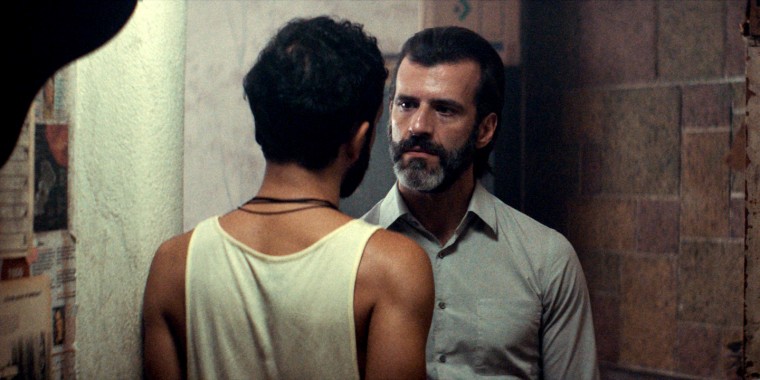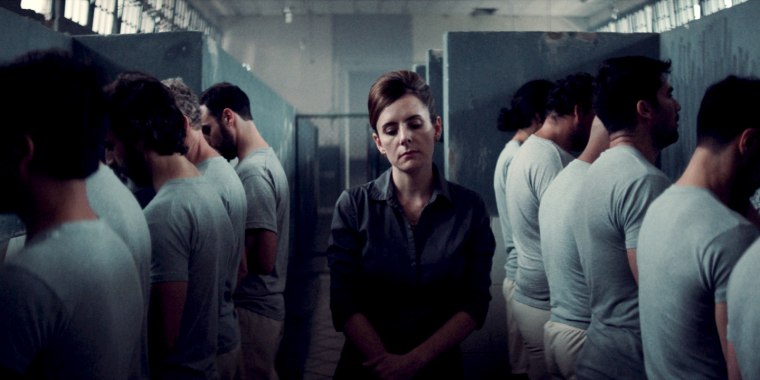Can You Live As A Gay Man and Loose Everything? "Temblores" This Guatemalan Movie Tries To Tell
By Arturo Conde
From the outside, Pablo has the perfect heterosexual family life. He has two beautiful kids with a lovely wife named Isa (played by Diane Bathen), a nice home and a good job. But inside, he struggles with his sexuality. So when he comes out as gay in his conservative Guatemala to his evangelical family, he must face a difficult question — is the love he feels for another man worth all the pain and suffering that comes with it?
“You can sense that there is a pain of not being real. And that’s what attracted me to Pablo’s character,” actor Juan Pablo Olyslager told NBC News about his role as an upper-middle-class man's struggle with his homosexuality in the award-winning Guatemalan movie “Temblores” ("tremors" in Spanish), which will have a limited release in select U.S. theaters starting on Nov. 29.
“He constructed a life that was a mirage, an illusion, and it fell down," Olyslager said. "It takes a lot of courage to come out. But I can understand when someone chooses to keep their sexuality private because we still live in a society that oppresses you.”
For the actor, the movie dramatizes the oppression that drives many LGBTQ people in Guatemala to leave their homes and emigrate to other open places around the world.

“Same-sex marriage is not legally recognized in Guatemala,” Olyslager said. “And in a conservative society where the majority is Catholic or Protestant, many people who are gay in my country choose to migrate to New York and San Francisco and other open cities around the world like Paris and Barcelona.”
“Temblores” reflects the emotional, intellectual and physical displacement that affects the LGBTQ community in Guatemala. This type of discrimination and alienation transcends all the social classes, said the actor.
“In some countries, when you come out, society still respects you because you have money,” he said. “But in Guatemala, homosexuality is a taboo subject. And you have problems in your life regardless of your social status.”
Olyslager says that the LGBTQ community is stigmatized in Guatemalan society, frequently mischaracterized by the social conservative majority as “sex addicts” and “pedophiles.”
Like Pablo, the actor comes from an upper-class family in Guatemala — his grandmother Walda Valenti was an established writer, and his cousin Verónica Riedel is Guatemala's first female movie director. But while Olyslager identifies as heterosexual off-screen, he says that he empathizes strongly with the LGBTQ community because many of his friends are facing intolerance through religion, work, and family. And the film strives to reflect this reality.
“You should know that this movie is based on a real story. It’s nonfiction. It’s based on the story of the first ‘Pablo’ that the director met.” he said, referring to Jayro Bustamante. “He also met other ‘Pablos’ later. So this is like a collage of all those ‘Pablos.’ Everything that you see is based on a truth, including the scene with the conversion therapy.”

This is Bustamante's second film; the first was the award-winning "Ixcanul," which also explored a character grappling with societal norms — in this case, an indigenous young woman facing an arranged marriage.
Olyslager said the film's depiction of the ripple effects — or “temblores” — that are caused by discrimination could compel viewers to reflect on the prejudices and stereotypes that affect identity. He hopes this helps drive people from different backgrounds to create more open spaces for everyone in society.
“You can choose to live like Pablo under the appearance of another identity,” Olyslager told NBC News. “But I think that if you cannot be true to yourself, your soul will ultimately die.”
Comments